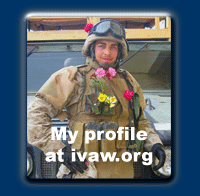I was actually against the war before the war. As a reservist attending Claremont McKenna College near LA, I attended the big day of student walkouts in February of 2003. There were speeches, a human peace sign, and a march through the middle of campus. I found myself surrounded by students and professors trying to relive the 60s. Their apparent ignorance was surpassed only by their lack of hygiene.
At our monthly drill in December of 2003 our Commanding Officer announced that the Marine Corps was seeking volunteers for the Third Civil Affairs Group. I jumped at the chance. I didn’t want to “miss the party.” I also believed at that time, along with most of America, that what we were doing in Iraq was cleaning up our mess. I thought it was responsible foreign policy, trying to do good by the Iraqi people.
I was activated two weeks before we were set to deploy. In between filling out forms and checking out gear, I got enough civil affairs training to learn that we would be working with the Iraqi people on local projects such as schools, clinics, mosques, and water projects. I was really excited about it. That was exactly what Bush was saying that we, as in Americans in Iraq, were doing there. I thought, “We are going to be leading the charge to rebuild Iraq.” (To Marines, every mission is a “charge.” Often times, Marines are tasked to lead the charge to clean the heads, or swab the decks, or stand around and smoke cigarettes.)
When I got to Iraq, it was a different story. We were six-man teams attached to battalions or regiments. And where we were in the Fallujah area, you couldn’t go anywhere without at least six humvees with machine guns. We often had to beg these infantry commanders to tag along on their convoys to accomplish our missions. We found ourselves constantly struggling to justify our existence. We even came up with a slogan: We care, so that you don’t have to.
Sure it was funny at the time, but in retrospect, it’s pretty messed up. Perhaps if the situation had been the other way around, namely that infantry units were attached to civil affairs teams, then the US military would have had some credibility with the Iraqi people when we told them that we were there to help them. But instead, we put the killers in charge. I’m not advocating a complete restructuring of the military here. Ours is the greatest on the earth, but it is designed to destroy other militaries. In the words of Jason Lemieux, “Hammers can’t fix computers.”
About halfway through my tour, I realized the futility of what we were doing in civil affairs and was forced to fall back on the old standard rationalization, “At least we’re keeping the fight off of American soil.” I was able to realize the fallacy of that soon after returning home. For every insurgent we kill today, there are two to kill tomorrow because we piss off so many people in the process.
The only way that I can describe the role of civil affairs in the occupation of Iraq is that it is a fig leaf. I was once praised for taking pictures of my team distributing humanitarian rations because they would be used in a propaganda magazine that would be distributed to Iraqis. I don’t believe it had much effect, (the Iraqi people know better) but it was clear that we were there more so that commanders could brag about all of the good we were doing rather than so that we could actually do any good.
We cared so that they didn’t have to. So that the infantry commanders didn’t have to. So that the joint chiefs didn’t have to. So that L. Paul Bremer (Director of Reconstruction and Humanitarian Assistance until the “handover of power” on June 28th, 2004) didn’t have to. So that Donald Rumsfeld didn’t have to. So Dick Cheney didn’t have to, not that he ever pretended to. And so that least of all, President Bush didn’t have to while he gushed about making life better for the Iraqi people. I risked my life so that they could look good, and they still failed. We were a fig leaf.
This appeared in the first issue of the official IVAW newsletter, SIT-REP.
Thursday, August 23, 2007
The Fig Leaf
Posted by Revolutionary Patriot at 9:50 PM
Subscribe to:
Post Comments (Atom)

















3 comments:
excellent article adam, can't wait for Sitrep to start coming out. good to meet you last weekend, kenyon and i and the rest of us are serving the cause back in san diego! www.ivaw-sd.org
Adam -
Thank you for having the courage to speak the truth.
i like the idea about having civil affairs teams as the main effort, with grunts supporting; security without development is futile, they have to be parallel. this last time around, our guys ran the civil projects. I don't know if this was because we didn't have any CAG units available, or what. It was a better way than what I've seen in the past, but grunts still don't prioritize urban renewal or economic growth.
-jeff sommers
Post a Comment